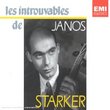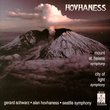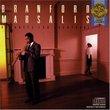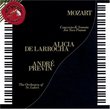| All Artists: Victor Ledbetter, Karol Szymanowski, Francis Poulenc, Gregorian Chant, Robert Shaw, Marietta Simpson, Atlanta Symphony Orchestra & Chorus, Christine Goerke Title: Szymanowski & Poulenc: Stabat Mater Members Wishing: 0 Total Copies: 0 Label: Telarc Release Date: 6/25/2002 Genre: Classical Styles: Opera & Classical Vocal, Chamber Music, Historical Periods, Classical (c.1770-1830), Early Music, Modern, 20th, & 21st Century, Sacred & Religious Number of Discs: 1 SwapaCD Credits: 1 UPC: 089408036224 |
Search - Victor Ledbetter, Karol Szymanowski, Francis Poulenc :: Szymanowski & Poulenc: Stabat Mater
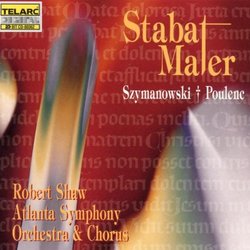 | Victor Ledbetter, Karol Szymanowski, Francis Poulenc Szymanowski & Poulenc: Stabat Mater Genre: Classical
|
Larger Image |
CD DetailsSimilar CDsSimilarly Requested CDs
|
CD ReviewsInspired performances Samer T Ismail | Danbury, CT | 09/23/2001 (5 out of 5 stars) "The two Stabat Maters on this disk (the opening track is six verses of a Gregorian chant of the same text) were both composed in remembrance of the dead (in Poulenc's case, a personal friend; in Szymanowski's, the daughter of the man who commissioned it; it is interesting to note that neither composer wrote a Requiem).The two works, however, are vastly different: Poulenc's work belies its title--it is almost a series of twelve choral dances, some fast and almost joyous, some slow and somber. The finale is impressive, if bizarre: the soprano soloist sings as if she were about to storm Heaven, and the final "Amen" is unusual as well.Szymanowski's "Stabat Mater" is, IMO, a much stronger work, ranking with those of Rossini and Dvorak as among the very best settings of this text. In six movements, it is sung here in Polish (Poulenc's is in Latin), which makes the sound simultaneously more exotic and more intensely personal. It moves through a wider arc of emotions, from simple counterpoint in the opening movement to a paean for chorus, baritone, full orchestra, and organ in the penultimate movement.But what makes this disc so special for me is the final movement of the Szymanowski. Shaw takes it a much slower pace--6 min, versus the usual 5 min--and the result is simply amazing: an almost heartbreaking yearning for heavenly peace that sends chills down my spine when I hear it.The Atlanta Symphony Chorus is outstanding as usual, and the soloists are uniformly excellent, especially soprano Christine Goerke.My only reservation about this disc is that the version I bought, four or five years ago, did not print the accented Polish characters in the libretto. I can only hope that has since been corrected. That aside, I highly recommend this CD." Two vastly different works... Samer T Ismail | 06/26/2000 (4 out of 5 stars) "Robert Shaw does a superb job in the performance of these two different versions of one of the most powerful religious texts, the Stabat Mater. Both composers do an exceptional fine job in their portrayal of the Mary weeping over her son Jesus' execution on the cross. The only similarity between these two compositions are the text, otherwise they are very different in their musical language and drammatic effect. The Szymanowski calls on tan extension of traditional romantic harmonies with a mixture of colorful harmonies drawn from the rich pallette of Debussy, and Scriabin. The rich choral writing is only intensified by a brilliant use of the orchestra. From the very beginning Szymanowski draws you into his mournful world and he takes you on an emotional journey that will pass before you quicker than you will realize leaving you with the desire to hear it again. The Poulenc setting contains no where near the same amounts of passion as Szymanowski's setting. Poulenc's simplistic harmonic language is beautiful but lacking in the same intesity as Szymanowski. The choral writing of Poulenc is at times awkward and sometimes distracts the listener's from his enchanting harmonies. The Robert Shaw Choral does a wonderful job in performaing these two works, and the soloists all have gorgeous voices that portray so powerfully the meaning of the texts. The Stabat Mater of Szymanowski is one of his best work but remains relatively unknown. The power of this work is equal to any choral work that I can imagine and it should be placed on the shelf next to Schubert, Mozart, Brahms, and Verdi. The Poulenc is nice, but is not nearly as high quality as the Szymanowwski." A few comments on Shaw's Szymanowski Mark Abel | Carlsbad, Ca. | 09/05/2008 (4 out of 5 stars) "I won't address Robert Shaw's version of the Poulenc Stabat Mater. It is a piece that has never done a thing for me, and when compared to the Szymanowski is rather pitiful and self-indulgent.
Shaw in general did a fine job with Szymanowski's beautiful and powerful setting, probably his most emotional and profound work and the most universally appealing of his later "Polish" compositions. Shaw made a canny choice of soloists -- soprano Christine Goerke is appreciated for her dead-on pitch (several of the Polish recordings of this work do not measure up in this respect), and mezzo Marietta Simpson (who shone in some late '80s performances in Los Angeles under Simon Rattle) and baritone Victor Ledbetter show ample appreciation of and passion for the piece. Shaw's conducting of the Atlanta Symphony is a tad restrained for my taste but reveals a serious study of the score and several original ideas on interpreting individual sections. The recording quality is a wee bit murky but far better than just about any other version available. The conductor is also to be commended for pointing out in the liner notes that Szymanowski's work predated by several years Stravinsky's "Symphony of Psalms," the piece many people think of first along the lines of "Religious/Eastern European/Early 20th Century." Stravinsky's piece is fine, to be sure, but I rate Szymanowski's a bit higher and it's quite possible that Stravinsky was influenced by it. But I was motivated to write this to offer a refutation of one of the earlier reviewer's contentions that Shaw is to be hailed for his tempo decisions in the Stabat Mater's final movement, which I consider the most moving in Szymanowski's entire output. In mid-movement, the composer brings the mezzo to the fore in a gripping section dominated by an insistent tympani beat and some stark and gorgeous solo woodwind writing. Shaw inexplicably chose to slow this key section down SO MUCH that its innate rhythm is completely lost -- and along with it the urgency of the mezzo and the shape of the woodwind lines. I'm surprised Simpson was even able to navigate her way through Shaw's bizarre concept, which stretches the vocal line very far from the composer's intention. Now stuck in this down-tempo "groove," the transcendentally beautiful sections that follow never quite achieve the final, gentle catharsis that Szymanowski wrote into the music. I just don't understand what Shaw was trying to do here. His choice seriously mars an otherwise exemplary recording." |

 Track Listings (19) - Disc #1
Track Listings (19) - Disc #1![The Beautiful Classics Box [Box Set]](/images/no_cover/m.png?v=a4e11020)
